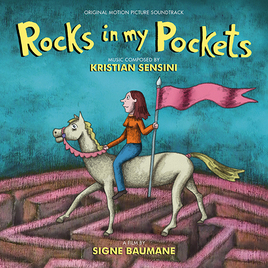
Aside from the creative animation by Baumane herself, the score by Italian composer Kristian Sensini also works to lend the film a darkly manic sense of humor. It's a small ensemble endeavor, led by piano, cello, flute, clarinet, and the double bass, with Latvian musician Sanita Sprūza contributing some indigenous flair on the kokle, an instrument similar to a zither. As Baumane narrates the film with her distinctively accented, airy voice, Sensini attempts to steer clear of overpowering her storytelling, which results in an unobtrusive and intriguing, albeit occasionally mixed, bag of musical tricks.
Much of the score proceeds in a jaunty, quirky style, as in the opening "How Not to Commit", which includes an intriguing quotation of Hermann's Vertigo on xylophone and accompanies Baumane's discussion of attempting suicide. Much of the score seems to offer counterpoint to the serious themes underlying the film, instead playing to the creative imagery and singsongy narration, and this cue is no exception. Another theme which takes this route is the waltzy "Anna's Theme", also heard in "Back Home", "Forest", "Signe and Anna", and "Rocks in My Pockets: End Titles". It's the score's most versatile and memorable theme, shifting from carefree to downtrodden with only minor changes in its carnivalesque orchestration. One of the score's other stronger cues, the over-the-top "Russians, Germans, Partisans", seems right out of Desplat's The Grand Budapest Hotel (a high compliment indeed!), with the "Partisans" theme proving to be of particular note.
The cues that take a more balanced approach to the humor, however, generally come across as a bit more emotionally engaging. The tender, glum "Helpless Creatures" is a beautiful little arpeggio-based piece with light vocal accents that prove emotionally affecting, and "Miranda's Theme" is an achingly morose exercise in conflicted emotions, with cello and piano tugging at the heartstrings. "Miranda's Solstice" injects a little more hope into the latter cue's equation, while an idea heard in the quietly reverent "Center of the Universe" heavily echoes Desplat's "children's theme" from his two Harry Potter and the Deathly Hallows scores (see "Polyjuice Potion" and "Harry and Ginny" in Part I).
Kristian Sensini's Rocks in my Pockets is an enjoyable little diversion, and certainly makes me intrigued to hear what else he has to offer as a composer. As it seeks to steer clear of interfering with the director's narration, some of it can come across as a little sparse and repetitive, and the lengthy album release doesn't exactly help this (though I still applaud MovieScore Media for distributing such niche scores). Regardless, though, it's clear that this effort has got a great deal of heart, and that it's an appropriately offbeat match for the film. If you're looking for something to hold you over until Desplat's next foray into absurdity with Wes Anderson, or if you still hold dear the days of Nino Rota's collaborations with Federico Fellini, this score may be worth a listen. Though I can't say I'll return to it as a whole with much frequency, "Russians, Germans, Partisans", "Miranda's Theme", and "Rocks in My Pockets: End Titles" are some of my favorite cues to grace an animated film this year.
| A Few Recommended Tracks: "Divorce Latvian Style", "Russians, German, Partisans", "Helpless Creatures", "Miranda's Theme", "Rocks in My Pockets: End Titles" Label: MovieScore Media Availability: 24 track edition | |

 RSS Feed
RSS Feed
